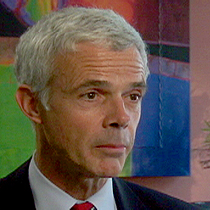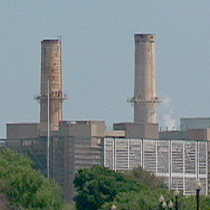2007年VOA标准英语-Debate Underway in US Over Coal's Future
搜索关注在线英语听力室公众号:tingroom,领取免费英语资料大礼包。
(单词翻译)
By Malcolm BrownWashington, D.C.
24 July 2007
The future of coal has become a hot topic in the United States. The debate sets concerns about global warming against the desire to reduce America's dependence1 on foreign energy sources. With the United States estimated to be sitting on about one-fourth of the world's coal reserves, the stakes are high. Malcolm Brown reports from a part of the country where the debate is being watched especially closely.
A pilot from the SouthWings conservation organization takes to the skies over West Virginia -- America's number two coal-producing state.
SouthWings provides these flights for free, so that reporters and others can get a clear view of a controversial technique for extracting the coal.
 |
| Frank O'Donnell |
Back in Washington, Frank O'Donnell, president of the environmental watchdog group, Clean Air Watch, sees conflicting pressures.
"Right now people are saying, 'Let's burn more coal, let's convert it into diesel3 fuel and that way we don't have to import so much oil,'” says O’Donnell. “The problem is, if we do that, we're probably going to increase greenhouse gas emissions4 at the same time. So, our desire to limit greenhouse gas emissions is almost pitted against our desire for energy security."
 |
| Over half of America's electricity comes from coal-burning power stations such as this one |
Its abundance makes coal a big player in any discussion about the politically appealing concept of American energy independence.
From her desk close to Capitol Hill, Carol Raulston of the National Mining Association monitors the debate; a debate that she feels is going the industry's way.
"We think coal does have a bright future,” says Raulston. “We need to correctly manage the environmental aspects of coal mining and coal use and we believe, with a really concerted effort towards developing new technologies, that there's a whole new day out there for coal."
 |
| Ed Wiley |
His view changed forever following multiple trips to bring his ailing5 granddaughter home early from a local school. Wiley became convinced that fumes6 and dust from adjacent coal operations were making her and other pupils ill.
"It really hit home,” says Wiley. “It really woke me up. It was like taking a sledgehammer and just hitting me upside the head with it." That experience made him a campaigner.
The mountaintop mining is what the activists7 are fighting. They say the surface mining technique, using explosives and heavy machinery8, is environmentally disastrous9 and dangerous for those who live nearby.
"We're actually blowing up part of the United States to keep power in here,” Wiley adds. “We're destroying our own living quarters to have power for people and we're destroying ourselves. That's what we're doing."
It's not just the United States using coal from West Virginia. The state's industry association says coal is shipped to 25 countries. Activists want end users to realize the price the region is paying.
From the air, you can see the bodies of waste water left over from coal processing. Opponents call these "toxic10 lakes". They worry about the contamination of local water supplies and the disaster that would follow any dam failure.
However, coal companies say their work is governed by environmental regulations, including the need to 'reclaim11' mined areas. Industry representative Carol Raulston says the result is economically productive level ground in a mountainous landscape.
"Not only do we think we can handle the environmental concerns, but it allows for really more of a sustained economy in those areas, because the sites can be used for other applications," she says.
Economic arguments work well in a state where the per capita income is among the lowest in the US. The industry says it pumps nearly a billion dollars a year into West Virginia's economy in wages alone. But to some locals, whose ancestors are buried in these mountains, the economic argument doesn't wash.
Yet with the U.S. government backing efforts to design a "pollution free" coal-powered plant, it's clear that the fuel is still considered an energy of the future.




